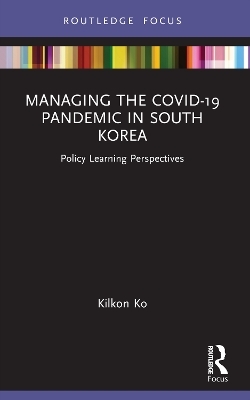
Managing the COVID-19 Pandemic in South Korea
Policy Learning Perspectives
Seiten
2024
Routledge (Verlag)
978-0-367-64540-3 (ISBN)
Routledge (Verlag)
978-0-367-64540-3 (ISBN)
This book examines the importance of accumulated disaster management experience and risk awareness of civil society by analyzing Korea’s COVID-19 response from the perspective of policy learning.
This book examines the importance of accumulated disaster management experience and the risk awareness of civil society by analyzing Korea’s COVID-19 response from the perspective of policy learning. Prior to the spread of COVID-19, Korea was a country with active exchange with China, with over six million Chinese visitors and over five million Korean visitors to China. Korea also has the highest population density among OECD countries and an urbanization rate exceeding 90%, making it vulnerable to the spread of infectious diseases. However, Korea had very low fatality and infection rates among OECD countries, despite foregoing border closures or city lockdowns.
Korea is known as a representative example of state-led economic development called the developmental state model. However, Korea’s COVID-19 response emphasizes citizen-led efforts, the use of information and communication technology, and successful disease control through cooperation between the government and civil society. This book presents examples that demonstrate the effectiveness of disaster response based on democratic values, by enhancing the capacity of civil society through social interaction resulting from various models such as rational models, heuristics, cooperative governance, policy networks, and complex adaptive systems. Additionally, it argues that the lesson learned from Korea’s COVID-19 experience is not that a strong state should control citizens’ freedom to increase the effectiveness of disease control, but rather that sharing the awareness of the risk enables voluntary citizen responses and solidarity consciousness of civil society is essential.
The book is a useful reference for anyone interested in learning more about the value of actors in policy networks.
This book examines the importance of accumulated disaster management experience and the risk awareness of civil society by analyzing Korea’s COVID-19 response from the perspective of policy learning. Prior to the spread of COVID-19, Korea was a country with active exchange with China, with over six million Chinese visitors and over five million Korean visitors to China. Korea also has the highest population density among OECD countries and an urbanization rate exceeding 90%, making it vulnerable to the spread of infectious diseases. However, Korea had very low fatality and infection rates among OECD countries, despite foregoing border closures or city lockdowns.
Korea is known as a representative example of state-led economic development called the developmental state model. However, Korea’s COVID-19 response emphasizes citizen-led efforts, the use of information and communication technology, and successful disease control through cooperation between the government and civil society. This book presents examples that demonstrate the effectiveness of disaster response based on democratic values, by enhancing the capacity of civil society through social interaction resulting from various models such as rational models, heuristics, cooperative governance, policy networks, and complex adaptive systems. Additionally, it argues that the lesson learned from Korea’s COVID-19 experience is not that a strong state should control citizens’ freedom to increase the effectiveness of disease control, but rather that sharing the awareness of the risk enables voluntary citizen responses and solidarity consciousness of civil society is essential.
The book is a useful reference for anyone interested in learning more about the value of actors in policy networks.
Kilkon Ko is Professor at the Graduate School of Public Administration, Asia Regional Information Center, Asia Center, Seoul National University, South Korea.
Contents
Preface
Chapter 1 Introduction
Chapter 2 Overview of the Evolution of COVID-19 in Korea
Chapter 3 Theoretical Frameworks for Understanding Disaster Management
Chapter 4 Learning from the MERS Experience in Korea
Chapter 5 Analysis of Korea’s COVID-19 Responses
Chapter 6 Boundary Spanning of Learning
Chapter 7 Conclusions
References
| Erscheinungsdatum | 11.07.2023 |
|---|---|
| Reihe/Serie | Routledge Focus on Public Governance in Asia |
| Zusatzinfo | 6 Tables, black and white; 16 Line drawings, black and white; 15 Halftones, black and white; 31 Illustrations, black and white |
| Verlagsort | London |
| Sprache | englisch |
| Maße | 138 x 216 mm |
| Gewicht | 258 g |
| Themenwelt | Sozialwissenschaften ► Politik / Verwaltung ► Staat / Verwaltung |
| Sozialwissenschaften ► Soziologie ► Spezielle Soziologien | |
| Technik ► Nachrichtentechnik | |
| Wirtschaft ► Betriebswirtschaft / Management ► Planung / Organisation | |
| ISBN-10 | 0-367-64540-8 / 0367645408 |
| ISBN-13 | 978-0-367-64540-3 / 9780367645403 |
| Zustand | Neuware |
| Informationen gemäß Produktsicherheitsverordnung (GPSR) | |
| Haben Sie eine Frage zum Produkt? |
Mehr entdecken
aus dem Bereich
aus dem Bereich
Organisationen steuern, Strukturen schaffen, Prozesse gestalten
Buch | Softcover (2024)
Rehm Verlag
38,00 €


